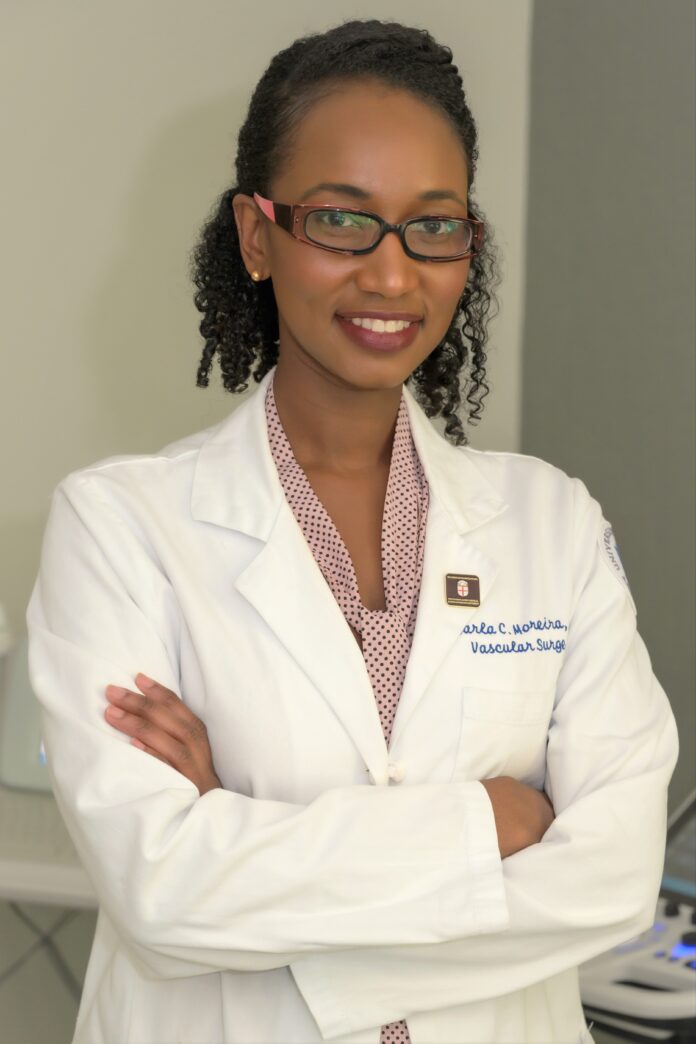Pawtucket native Dr. Carla C. Moreira stayed in her home state to graduate from the Warren Alpert Medical School of Brown University. She now serves as assistant professor of surgery at Warren Alpert, and as a surgeon in the division of vascular and endovascular surgery at Rhode Island and The Miriam hospitals. She is also section chief of vascular and endovascular surgery at the Providence VA Medical Center. In addition to her medical work, Moreira is a member of Brown’s diversity team, and devotes time to public health needs in Pawtucket.
PBN: Please describe the community work you are doing in Pawtucket.
MOREIRA: I recently became involved with Cape Verdean American Community Development. They have been a tremendous and reliable resource for the Cape Verdean community in Rhode Island and Massachusetts. They provide multiple services locally such as youth and jobs-training programs, intercultural events and, more recently, outreach and collaboration with health organizations and providers to improve access to health services.
This past November, the center held a health and wellness fair, which I was honored to be a part of. Since then, I’ve joined the Cape Verdean American Health Council, a group of health care workers and community organizers focused on identifying and decreasing health disparities among Cape Verdean and other minority groups.
PBN: What are some of the public health needs you are seeing?
MOREIRA: The public health needs in Pawtucket are similar to those in most working-class communities across this country: affordable and easy access to primary care, preventive health services, mental health treatment, child care and elderly care. These issues are compounded and amplified when there are language and cultural barriers.
The resultant public health crisis is evident by persistent disparities in the health and health care of the communities with the highest needs but least resources. For example, these is a large unmet need for culturally and language-appropriate educational material on basic health conditions and resources for Kriolo, Portuguese and Spanish-speaking patients in communities [such as] Pawtucket and Central Falls.
Partnership between community organizations [such as] CACD and Progreso Latino and health providers/organizations are essential for bridging those gaps. This scenario presents a challenge and an opportunity; for providers, I say get out of your offices and clinics and [talk to] these community leaders and see where and how your patients live. This is because if you can truly understand your patient, understand how they live, how their illness impacts their lives and, more importantly, how their lives impact their illness, you will be a demonstrably better doctor and steward of the health care system.
For patients, I would encourage them to take ownership of their health care, know their rights and feel empowered to demand good care for themselves and their neighbors.
PBN: You grew up in Pawtucket and graduated from the Warren Alpert Medical School of Brown University. Why did you decide to return home to practice medicine?
MOREIRA: The answer may sound a bit cliché, but the answer is rooted in the same sentiment of why I wanted to become a doctor – to help people. More specifically, I wanted to help my grandfather. He had a chronic health condition that required frequent trips to doctors’ offices, specialty clinics and emergency departments. He didn’t speak English; I did. He had very low health literacy; I was endlessly fascinated and enthralled. He was the patient; I was his translator. He passed away during my first year of vascular surgery fellowship.
The best memories of my grandfather were not in clinics or hospital rooms, but the most important lessons were. Everyone deserves kindness, empathy and respect. This is especially true during moments of when we [are] most vulnerable, moments of mental and physical illness. I was so happy and proud that I would be a fierce advocate for my grandfather; that I could decipher confusing, scary, or painful moments, turning them into information and anecdotes in his native language with the appropriate cultural context, which allowed him to keep his dignity and agency for as long as possible.
There are thousands of patients just like my grandfather, who unfortunately come up against these language and cultural barriers alone. Having grown up in Pawtucket, a diverse community, speaking Kriolo, Portuguese and Spanish, I feel privileged having this language and cultural dexterity and see it as an asset, which has enhanced all my professional relationships and patient interactions. I wanted to return to this community to practice and continue the work to break down barriers and improve access to the world-class care offered right here in Rhode Island.
PBN: Do you think health systems in Rhode Island are doing enough to recruit young physicians, particularly specialists?
MOREIRA: I wish I could say “yes” because we have so much to offer. As I mentioned, I wanted to work [and] return to Rhode Island because of how diverse and vibrant our communities are. However, there are many unique challenges for physicians working in Rhode Island. Some of these issues have made the news and editorial pages.
A major issue is the lack of a cohesive health care system that puts patients at the center. There are lots of silos and fractures in the existing system, which are made worse by increasing external pressures from out-of-state players.
As a specialist, my compensation and reimbursement would significantly increase by just moving across state lines. In recently published national data on physician compensation, Providence ranked dead last for metro areas with lowest average annual salary for female physicians. This problem is multifactorial, but I’m not even sure who or what organizations are working on fixing it!
On the other hand, I see glimmers of hope. Every physician working in Rhode Island is here because they have a personal connection and stake in seeing the system improve. The formation of Brown Physicians Inc. is a step in the right direction. I’m very encouraged about forging stronger relationships between Brown University, Alpert Medical School and the various medical foundations as means of sharing resources, increasing capacity and punching holes in the silos that are preventing effective recruitment and retention of young, exceptional physicians to our state.
PBN: How long have you been a member of the diversity team at Brown, and what are some of the team’s priorities?
MOREIRA: I’ve been closely involved with the diversity and inclusion initiatives at Brown and BPI for about two years now. I became the diversity officer for the surgery department in 2018 and sit on multiple committees, at the university, foundation and departmental level that deal directly with implementing the Diversity & Inclusion Action Plan for Brown University.
This bold initiative was established by President Christina Paxson in 2016 and provides a comprehensive plan for fostering diversity and inclusion throughout Brown and its affiliates through prioritizing people, academic excellence, curriculum expansion, community, knowledge and accountability.
One of the priorities is to increase the recruitment and retention of underrepresented minority residents and faculty in the health care force. This work is necessary to make sure our institutions and state remain competitive in attracting and retaining top talent in an ever-changing and diverse landscape.
Elizabeth Graham is a PBN staff writer. She can be reached at Graham@PBN.com.













